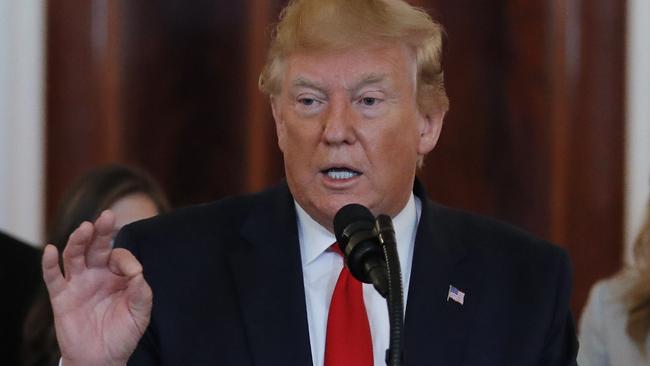
The president announced the extra sanctions with a warning to Iran that “restraint” by the United States has its limits.
But Trump has locked himself into a cycle with Iran that leaves him little choice but to show military restraint.
Trump’s last minute backflip last week, ordering and then cancelling military strikes against Iran has damaged him — not because it was the wrong decision to abort the attack, but because it revealed to Tehran the limits of the president’s will.
Trump campaigned in 2016 on reducing US military involvement in “endless wars” in the Middle East. It was a core promise by a president who likes to keep his promises.
As one of Trump’s friends and occasional adviser, Fox News commentator Tucker Carson put it: “Bombing Iran would have ended his political career in a minute, there would have been no chance of re-election after that.
“Ill-advised wars are like doing cocaine: The initial rush rises your poll numbers, but the crash is inevitable.”
Despite Trump’s bellicose rhetoric, he cannot justify a military strike against Iran at this moment without damaging himself. The only justification for such a strike would be if Iran launched an attack which cost American lives, an act of provocation which would be self-defeating for Tehran. Even then, Trump would have to ensure that any retaliatory US strike was limited and did not escalate to a broader conflict.
Trump’s very public flip-flop on military action last week allows Tehran to keep niggling the US in the knowledge that military retaliation for minor provocations are unlikely. This might encourage the regime to launch more attacks on tankers in the Gulf of Oman, or shoot down another US drone or continue to breach aspects of the 2015 nuclear deal as it says it will do within days by exceeding limited on enriched uranium.
In response, the US can try to keep tightening whatever sanctions are left for it to tighten against Iran. This will further provoke Iran. It will also bring the US increasingly into conflict with Europe, China and others who buy oil and trade with Iran and are being caught in the crossfire.
The White House had hoped that US economic sanctions — especially its attempt to stop Iran exporting oil — would encourage regime change or somehow bring Iran to the negotiating table on its nuclear program.
There is no sign of that happening. Instead the Iranian regime seems to be digging in for a prolonged stand-off with Washington. This tit-for-tat escalation of tensions is exactly what many other countries, including Australia, feared when Trump withdrew from the nuclear deal in 2018 and slapped heavy sanctions against Iran.
So far, Trump’s Iran strategy has delivered little beyond escalating tensions across the Middle East.
Cameron Stewart is also US Contributor for Sky News Australia




Donald Trump is fast running out of good options to deal with Iran despite choosing today to impose fresh sanctions, this time directly on Iran’s leaders.